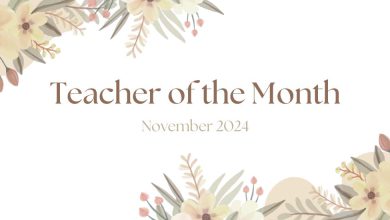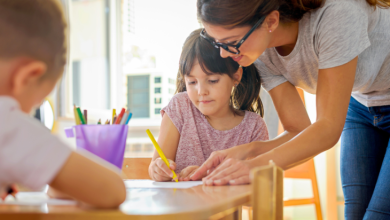What Makes a Great Preschool Teacher?

What Makes a Great Preschool Teacher?
At Little Sunshine’s Playhouse & Preschool®, we understand quality educators are the most important factor for engaging children in positive learning experiences.
An early childhood teacher is not a babysitter. He or she is an education professional who serves as the foundation of our school. Our proprietary Creatively Shine™ curriculum was built with the teacher-student relationship in mind.
But what makes a great preschool teacher? Here are a few of the priorities a reputable early childhood education program should look for when recruiting and training the outstanding educators who lead classrooms.
Passion & Enthusiasm
Above all else, great preschool teachers love what they do.
Working with young children can be immensely rewarding and fun, but also unpredictable and even stressful at times. Passion for helping kids achieve important milestones, and celebrating each new accomplishment with them, is what keeps teachers motivated no matter what each day brings.
Patience & Sense of Humor
The National Association for the Education of Young Children (NAEYC) offers this as advice for new teachers, but really it’s important for teachers at every experience level.
Young children are full of energy and curiosity, and they come with their own individual personalities, attention spans, challenges and learning styles. Sometimes they require more than a little repetition while mastering everything from solving new math problems to learning good manners.
A great preschool teacher maintains a positive disposition while repeating directions, cleaning up messes and resolving the occasional conflict between peers.
It also helps to include a little laughter along the way. Funny rhymes, stories, songs and other activities lighten the mood and make learning fun for teachers and students alike!
Creativity & Flexibility
According to one early childhood expert, one way to assess the effectiveness of a preschool teacher is to look at the classroom art projects. They should all be different, which indicates a willingness to let each student express his or her own perspective on the subject.
Great teachers will adapt the lesson content in response to student needs and interests. For example, if the children are fascinated by spider webs on the playground, it’s an excellent opportunity to introduce a number of engaging activities:
- Talk about the basic characteristics of spiders: How many legs to they have? Why do you think they build webs? How are they different from insects?
- Sing the “Itsy Bitsy Spider” during music time.
- Draw colorful pictures of spiders.
- Read and act out stories about spiders.
Creativity also comes in handy when simplifying potentially complex subjects like math and language, or for dealing with unexpected events throughout the school day.
Communication Skills
Another good piece of advice the NAEYC offers preschool teachers is to “be yourself.” Communicating authentically, and letting children get to know the teacher as a “real person” builds a sense of trust that fosters a healthy learning environment.
Preschool teachers must relate to children on their level, breaking subjects down into small chunks that youngsters can grasp.
The teacher must also keep parents informed about their children’s progress, and maintain open dialogue with fellow teachers and administrators to make sure best practices are being followed and to stay up-to-date on the most effective teaching methods.
Organized & Consistent
A well-prepared teacher selects purposeful, age-appropriate activities, and can articulate a specific learning goal for every assignment. Planning ahead also puts the teacher in a better position to be patient, flexible and creative.
The NAEYC points out a number of important things to include when planning classroom activities:
- A good mix of whole group and small group activities
- Regular learning center activities
- Procedures in place for handling spills, accidents, first aid and other mishaps
- Attention to classroom safety, such as keeping poisons out of reach and locked away
Consistent scheduling is also very important. Young children adapt to school more easily when there’s a predictable routine in place, such as having storytime at the same time every day.
Respectful of Differences
A great preschool teacher respects every child as an autonomous individual with a unique set of interests, strengths and challenges. Some kids may love sports, while others get energized by writing, drawing or solving puzzles. One great way to adapt lessons is to relate them to a child’s existing interests.
Effective preschool teachers are also responsive to the needs of students with varying learning styles and attention spans, as well as those from diverse cultural backgrounds.
Curiosity
One of the guiding principles of our Reggio Emilia-inspired curriculum is that teachers must be observers and researchers who learn alongside their students.
The NAEYC also emphasizes that observation is a teacher’s best tool for tracking each student’s growth and development, for revising lesson content and enhancing the learning environment itself.
Teachers need the flexibility to adapt classroom activities to be more effective. Experimentation, in which teachers track the effectiveness of different activities, leads to continuous improvement based on solid evidence of what works and what doesn’t.
Little Sunshine’s Playhouse® goes beyond minimum state licensing requirements and hires exceptional teachers who help our students thrive.
Teachers are supported with ongoing professional training, which covers such topics as classroom management, age-appropriate activities, effective discipline and positive communication.
Here are some questions you can ask your child’s teacher or during your next preschool tour:
- What are some of your favorite lessons to teach your students and how do you get them engaged?
- How do you celebrate new student accomplishments with your students?
- How do you adapt your lesson plans to accommodate different learning styles?
- How do you handle conflict or classroom disruptions or conflicts?
- What are some things you do to build a sense of trust with your students?
Contact a Little Sunshine’s Playhouse near you to learn more!





